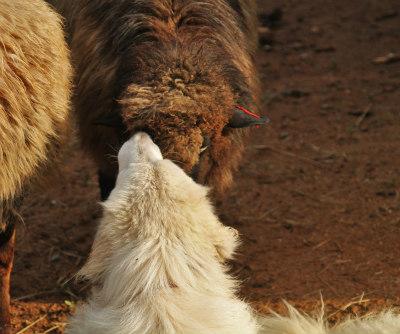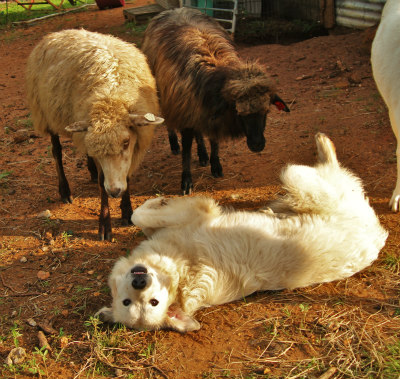Farm Fresh BlogWednesday, October 24 2018
Those of you with a dog training (or dolphin training!) background will remember Karen Pryor's book, "Don't Shoot The Dog." In my day it was mandatory reading. It's about more than just clicker training. If you haven't read it, pick it up. That book dates me though. I've been training dogs most of my adult life and I can tell you this - fads come and go, but dogs are always the same, and they don't read the books. But you should. I started out in sport dogs, then moved to show dogs, then working dogs, and now ranch dogs. There are some rules I've learned over the years. Purely positive dog training is nice in theory and it makes everyone feel good about themselves, but it isn't always reliable. Sometimes dogs, like kids, need to understand that the hand of God will reach out and smite them when they've committed a grievous sin. In this blog I've always tried to share the triumphs and the tragedies because ranching is not always about babies and butterflies, sometimes it's about blood and bird feathers. The #1 reason why so many Livestock Guardian Dog breeds end up being dumped is because people don't train the puppy. And they are puppies. For the first two years that giant behemoth is a puppy. People always ask me "What is the key to raising a Livestock Guardian Dog?" My answer is simple. Supervision. Supervision. Supervision. First let us assume that you do have a Livestock Guardian Dog puppy comprised of some combination of Livestock Guardian Dog breeds. There are too many to count but here is a list of the most common: Great Pyrenees, Anatolian Shepherd, Maremma, Akbash, Kangal, Polish Tatra, Karakachan, Sarplaninac, and Tornjak. If your dog is some combination of these dogs, then you most likely have the raw material for a good Livestock Guardian Dog. If your dog has ONE of these breeds combined with some other breed, such as a Labrador, Blue Heeler, or Border Collie, then you don't have a Livestock Guardian Dog, you have a pet. And there is nothing wrong with a dog being a fine pet, just don't trust it with your livestock. Before you regale me with tales of your Border Collie/Pyrenees cross who is the smartest dog since Lassie, let me just give a word of caution. Livestock Guardian Dog breeds come from generations upon generations of breeding for one job - protecting livestock. When you monkey with that breeding by adding things such as Labradors and St Bernards into the pot, you have unwittingly added traits and behaviors that go against what a Livestock Guardian Dog is bred to do. Prepare yourself. Genetics have a way of popping up at the most inopportune moments. So let's go back to our assumption that you do indeed, have a Livestock Guardian Dog puppy. How do you train it? The one piece of bad advice which is simply the booger on the end of your finger that you just can't seem to shake off is this - put the puppy alone with the livestock and have no contact with him. Then he'll bond with the stock instead of becoming a pet. I really wish I could smack these people over the head with a dead chicken. This piece of advice is the #1 reason why people trash Livestock Guardian Dogs. Quit doing it, folks. Stop it right now. You will end up with dead livestock and giant dog that you cannot handle. So what do you do? You supervise the dog. Put him with the livestock but protect him from them and them from him. Kennel your puppy in a pen with your sheep. Put the dog in a separate pen so he can be with the stock but not be harmed or harm them. During the day when the flock is loose your pup may have to be locked by himself where he can see them, or you may have to leave a few sheep inside the pens beside the pup for company. When you are there to supervise, let them loose together. Do not let your pup play rough games with your livestock. Yes, he is playing. And yes, that's how he learns to kill. The game gets out of hand. Toss a bucket at his head immediately and inform him that is unacceptable behavior. I toss a lot of buckets when I'm training puppies. Now let's move on to older pups. They seem dependable. They do. They do all the right things. They are submissive to the stock. They follow the stock. They seem to be buddies. This is when you are most likely to screw up. You think the pup is grown and ready for prime time. He is not. This is when poor decisions are made. For example:
Bramble got the crap beat out of her with a dead bird this week. And it was my fault. First off, it is never the dog's fault. You're the one with the big brain and the thumbs. If things go south, it's your fault. And so the events that unfolded were entirely my fault. Bramble (Bam-Bam) has been a model Livestock Guardian Dog puppy. She's submissive to goats and sheep, and she ignores the free range poultry. Bramble is in the point of her career where she is given more and more free time and responsibility. She has been shouldering this well - until Monday morning. Because I had an appointment and would be gone, I chose to lock Bramble up in a large pen with the Other Half's cow dogs because her sheep were already out to pasture and I didn't want her unattended while I was gone. I locked her up and then went inside the house to change clothes. On my way out the door, I heard Other Half yelling and using the Lord's name in vain. Apparently a free range guinea had chosen to fly INTO the dog pen with a Border Collie, a Blue Heeler, and a Pyrenees puppy. Poor life choice. We've accidentally locked chickens in the dog pens countless times with no tragedy. The chickens tend to walk out of dog house like little Napoleans and strut around the pen with the dogs. A guinea is a much more reactive creature. They fly against the bars like a pinball. This behavior is a surefire way to awaken the prey drive in even the most dull of dogs. When Other Half rounded the corner he saw his Border Collie and Bramble actively playing tug with a dead guinea. My guess is that Bramble killed the guinea and the Border Collie thought that was a fine idea and joined the fun. No matter which dog killed the guinea, both were in position of a dead bird and Bramble was having fun. Read my lips - she was not trying to save the poor bird from the Border Collie. She was having a spot of fun and it got out of hand. After verifying that the bird was indeed, deceased, I did the unthinkable. I beat Bramble with the dead bird. She was horrified. Truthfully it was probably not any more painful than a pillow fight, but it rocked her world. She has never been smacked with anything other than a bucket (probably more painful) and being hit with a dead bird by someone she trusted was terrifying. I hated to do it, but here's the thing - I freaking can't have her killing birds for fun. And as horrifying as the experience was for her, the poor bird was probably having no fun when she killed it either. Shouting, "No, NO, Bad Dog" wasn't enough of a correction for the crime. This was a monumental sin which required a monumental punishment. She was beaten with the dead bird and locked in a kennel by herself. As I washed my hands I realized that I would be late for my appointment and my only excuse was "I'm sorry I'm late but I had to beat my dog with a dead bird." When I returned, all was forgiven. Why didn't I take the dog to the pound? She had the taste of blood. She can never be trusted, can she? Horse Hockey. Bramble is a puppy. Puppies do those things. I should have locked her in a kennel that a guinea could not fly into because I know she is too young for that kind of temptation. Briar, my oldest and best Livestock Guardian Dog, was a confirmed chicken killer. She killed every one of the neighbor's chickens that walked across our barnyard. She killed them and she ate them. Briar knows that chicken tastes good. When we got chickens at this place I made a point to teach Briar that these chickens were part of the farm and were not to be eaten. She is now fine with free-range chickens. We have 12 dogs and 17 free-range chickens and 5 (now 4!) guineas. I use the same training method on everyone. If you make a chicken run for any reason, I scream at you and bounce a bucket off your head. This method is high effective but you actually have to be present to toss a bucket at their head. This means that if the dogs are loose with chickens you must be out there until the dogs are trained. If you can't be, either lock up the dogs or lock up the chickens. Do not get rid of the dogs. Too many Livestock Guardian Dogs end up trashed because no one took the time to train them properly. Trust me, it is far easier to train the first dog than it is to get another dog, keep it until it kills something and then shoot it, then get another dog, keep that one until it kills something, then get rid of that one and get another breed of Livestock Guardian Dog. If you don't change what you're doing the same thing will happen again. The cycle will continue until you give up and proclaim that Livestock Guardian Dogs don't work. Or until someone beats you over the head with a dead chicken. Don't trash your pup, train your pup. And when mistakes happen, it isn't the end of the world. There is nothing wrong with your dog. He just isn't ready for prime time yet. Give him time and training. It's worth the investment. Supervise your dog and your livestock. And when you can't supervise them, lock them in a safe place. My mistake was that I didn't lock Bramble in a safe place. Comments:
Excellent information. As I chuckled, I learned!
Posted by Nolvia Pruitt on 10/28/2018 - 09:30 PM
Good article. Have added it to my rescue file page as a must read
Posted by Liz [Vic Aust.] on 11/14/2018 - 11:09 PM
|









